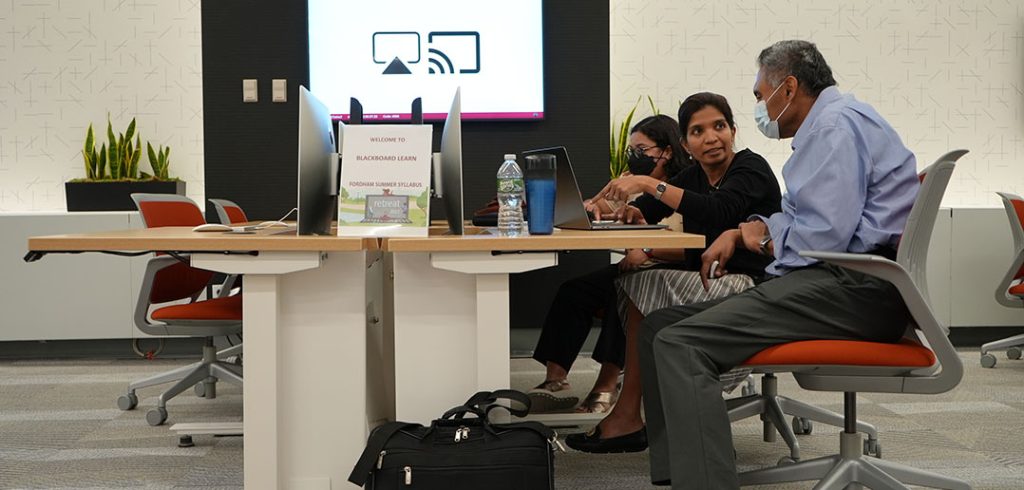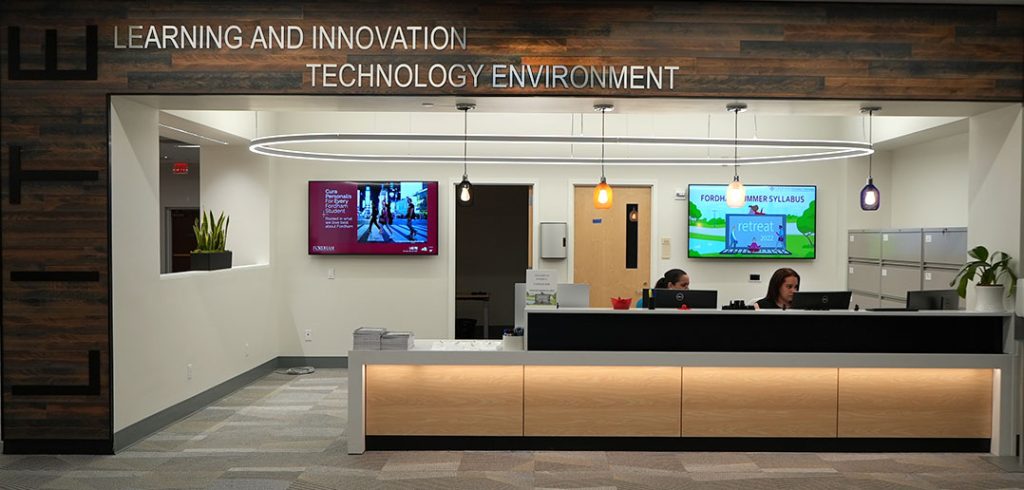LITE, which stands for Learning & Innovative Technology Environment, offers an array of cutting-edge educational technologies. It reflects a national trend toward learning commons, said Fleur Eshghi, Ed.D., associate vice president of educational technology research computing. Learning commons are shared collaborative spaces, usually located in libraries, where students, faculty, and staff can meet to brainstorm, socialize, research, and strategize, said Eshghi.
“Learning commons can include the use of traditional materials, like books, but if you need to go somewhere to produce materials or use the latest technology together with your colleagues, this is the place,” said Eshghi.
As a collaboration between The Office of Information Technology and Fordham Libraries, Eshghi said the space is for everyone, but particularly for faculty and students. The center provides both low-tech technologies (a sewing machine) and state-of-the-art computer tech (virtual and augmented reality). Unlike other areas of the library, talking is permitted—even encouraged. There are small lounge areas for breakout sessions. Several tall tables with stools sit beside whiteboards, encouraging small-group brainstorming. There are banks of computer stations where the computers can fold under the table and turn the surface into a conference table.
LITE Features:
- IT Service Desk. An integrated technology support center and information desk with day-to-day IT support from IT professionals and academic peers
- A maker space facility for production with 3D printers, a laser cutter, a large format printer, and a handheld 3D scanner
- Two sound-suppressed recording and podcasting rooms with microphones and green screens
- Several collaborative work areas
- Fordham’s Laptop Loaner program, which lends out laptops, webcams, microphones, and more
- High-end computer workstations for multimedia production, programming, and coding
- An XR lab area for virtual and augmented realities
- A 360 camera
- Assistive technology workstation
- Two Air acoustic pod rooms. Multi-use rooms used for collaborating, recordings, or video conferencing
 And if there is a snag in using the equipment, not to worry. LITE has a full-time IT staffer on hand in case something goes wrong with the tech.
And if there is a snag in using the equipment, not to worry. LITE has a full-time IT staffer on hand in case something goes wrong with the tech.
“We believe nothing kills the spirit of creativity and momentum than when you have a technical issue and you don’t know where to go, or you have to put everything away and go to another building to get help,” said Eshghi.
In imagining the center, Eshghi surveyed the Fordham community about their needs.
“I interviewed practically every department at the University to see what is it that they see in the future,” said Eshghi. “We have to go hand in hand with the academic departments; we’re an extension to what is going on in the classes and in their labs.”

Mix and Match Tech
Nicola Terzulli, the lead in learning space design for the center, said that while each piece of technology can be used on its own, much of it could be combined.
Terzulli noted that not only can a professor combine 360-degree camera and the VR, as in the case of Chartres, but artifacts from the site could also be scanned on the 3-D scanner and then printed out on the 3-D printer. Later, a podcast could also be made about a site.
“Everything can be mixed and matched to the medium,” said Terzulli.
For example, he noted that the anthropology department could use a 3-D scanner to scan a delicate fossil, or even a human skull, and the 3-D printer could then print it out so that students can handle the object without fear of damaging it.
For some professors, there will be a bit of a learning curve when using the technology, whereas for students it may be less so. For example, students who are into gaming may find that using the controls to the VR comes naturally. On a recent visit, LITE tech assistant Jackson Saunders, a sophomore at Fordham College at Rose Hill, assisted Curator of University Art Jennifer Udell, Ph.D., in locating an obscure archeological site in Greece. Udell said that she could definitely see assigning students to virtually visit various sites around the ancient world.
“Then they can teach me,” she said.
For questions about the LITE center, to collaborate, or schedule a tour, please contact the LITE director, Nicole Zeidan, Ed.D., or their staff at LITE@fordham.edu. For a virtual tour, visit fordham.edu/lite.

